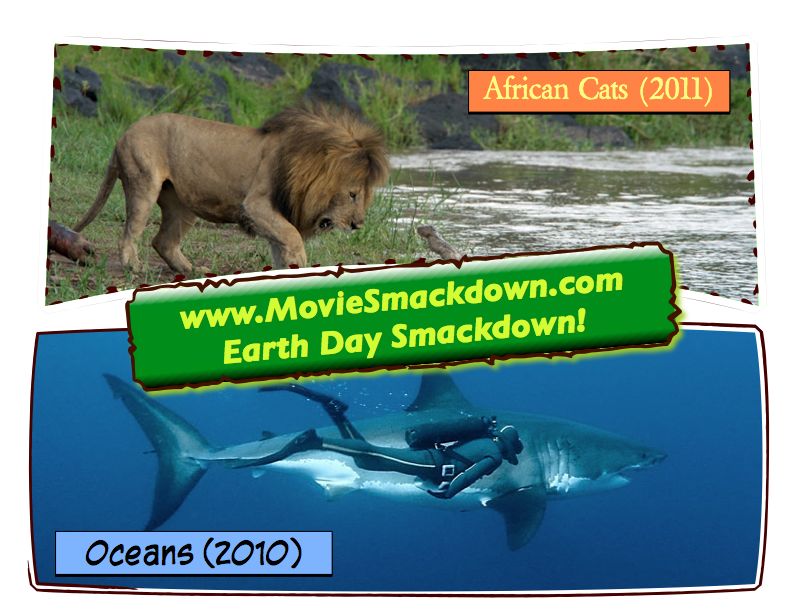
 The Smackdown
The Smackdown
If Disney has learned anything over the years, it’s that lions are kings at the box office. So the House of Mouse has gone back to Africa this year to bring us a new documentary about the king of the beasts. But from a different point of view. Don’t expect to see any singing warthogs or meerkats. This is a true story of life on the Savannah.
A few years ago, The Walt Disney Company established a new film label called Disneynature — with a mission to distribute nature documentaries like the old “True-Life Adventures” back in the 1950s. In a stroke of marketing genius, they tied the film releases to coincide with Earth Day. The first, appropriately titled Earth, came out in 2009. The next year, they released Oceans. These films looked at our planet in a new way, and they examined our influence on our environment.
It has become a tradition with my family to celebrate Earth Day each year with an outing to the theater to see the latest Disneynature release. This year, we continued with African Cats, a film that examines the lives of the lions and cheetahs of the Kenyan wilderness.
[singlepic id=533 w=320 h=240 float=right]
The Challenger
In African Cats, Samuel L. Jackson narrates the story of two mothers: an aging lioness named Layla who is trying to raise her 6-month old cub, Mara, in a large pride; and Sita, a cheetah mother raising her cubs alone.
The two different stories are each compelling. While Layla has the support of a large pride, her age and inability to hunt are putting her and her cub in jeopardy. Sita, on the other hand, is trying to raise her cubs without any support. She must leave them alone when she hunts, and she is always in danger of losing her cubs to other predators.
[singlepic id=532 w=320 h=240 float=right]
The Defending Champion
Pierce Brosnon narrates the French nature documentary directed by Jacques Perrin. Oceans explores the wonders of the world’s oceans and the life that exists on its shores. The film spans the globe, looking at life in different oceans, from the large to the small, the ugly to the hauntingly beautiful. Oceans does an excellent job of uncovering the unseen world beneath the waves.
Oceans also includes a deeper environmental message concerning the disappearing wonders of the sea.
The Scorecard
Comparing two documentaries on different subjects is not without its challenges. Both films spotlight animals that most people never see up close, outside of zoos. Both films include stunning cinematography — and on this point Oceans wins merely on the basis of wonder and variety. And both films include an environmental message, although that message is much more subtle in African Cats.
The difference in the two films comes in the storytelling. Oceans gives us vignettes of many types of marine life: fish and mammals, as well as birds and reptiles. The story is a global one, that emphasizes the interconnectedness of all ocean life.
Meanwhile, African Cats tells a very small story. Focusing on two particular families, one cheetah and one lion, the film gives us a personal story. The narration anthropomorphizes the action of the big cats, giving the audience more reason to care about them. The narration implies certain characteristics to the animals, but these are not necessarily realistic. Saying that the lion Kali is “looking to expand his empire to the south of the river” is not necessarily true, but it makes for great storytelling.
What is true is how African Cats emotionally invests us in the action. We are drawn into the stories of two mothers and their cubs. We want them to do more than survive, we want to see them succeed in achieving their goals. We want them to be happy, healthy, and safe. Unfortunately, on the Savannah safety is not always possible. Bad things happen. And though the film leaves out some gruesome details, it’s clear that the wilderness runs on the Darwinian law “survival of the fittest.”
Oceans seems more intent on telling an environmental message. While this message seems especially appropriate because the film was released on Earth Day, it’s a bit overdone. By the time the film is finished, I felt I had been watching a public service announcement — not a film.
The Decision
For two great films so evenly matched, the decision comes down to one thing: storytelling. Oceans, for all its beauty, may help us connect to the ocean as a whole, but it fails to reach the emotional impact of a personal story. African Cats creates two simple stories. As I followed these stories to their inevitable conclusions, I was both saddened and pleased. I wanted to see Sita and Layla succeed as mothers, and in their own ways they both did.
African Cats wins the fight, and takes the title as Disneynature’s best release yet.




Leave a Reply